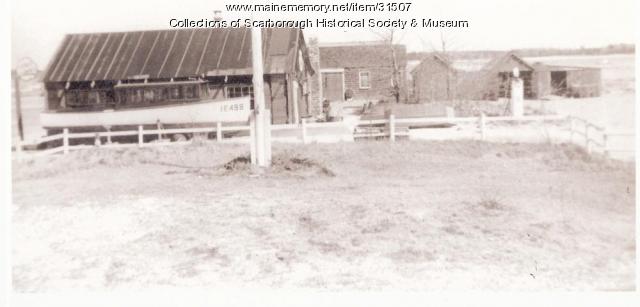Keywords: maritime trade
Item 102023
Thomas Robison from Thomas Hodges regarding illegal slave trade, Les Cayes, April 6, 1791
Contributed by: Maine Historical Society Date: 1791 Location: Portland; Les Cayes Media: Ink on paper
Item 27865
Charter Contract, Schooner Platina, 1845
Contributed by: Patten Free Library Date: 1845-05-02 Location: New York; Antwerp Media: Ink on paper
Exhibit
Britain was especially interested in occupying Maine during the Colonial era to take advantage of the timber resources. The tall, straight, old growth white pines were perfect for ships' masts to help supply the growing Royal Navy.
Exhibit
The Life and Legacy of the George Tate Family
Captain George Tate, mast agent for the King of England from 1751 to the Revolutionary War, and his descendants helped shape the development of Portland (first known as Falmouth) through activities such as commerce, shipping, and real estate.
Site Page
Scarborough: They Called It Owascoag - Maritime Tales: Shipyards and Shipwrecks - Page 1 of 2
"Maritime Tales: Shipyards and Shipwrecks Text by Bruce Thurlow Images from Scarborough Historical Society, Rodney Laughton and Don Googins…"
Site Page
Scarborough: They Called It Owascoag - Historical Overview - Page 1 of 4
"Stratton and his companions traded with Indians and the fishing fleets that visited the Maine coast."
Story
A first encounter with Bath and its wonderful history
by John Decker
Visiting the Maine Maritime Museum as part of a conference
Story
Maine and the Atlantic World Slave Economy
by Seth Goldstein
How Maine's historic industries are tied to slavery
Lesson Plan
Primary Sources: The Maine Shipyard
Grade Level: 9-12
Content Area: Social Studies
This lesson plan will give students a close-up look at historical operations behind Maine's famed shipbuilding and shipping industries. Students will examine primary sources including letters, bills of lading, images, and objects, and draw informed hypotheses about the evolution of the seafaring industry and its impact on Maine’s communities over time.
Lesson Plan
Becoming Maine: The District of Maine's Coastal Economy
Grade Level: 3-5
Content Area: Social Studies
This lesson plan will introduce students to the maritime economy of Maine prior to statehood and to the Coasting Law that impacted the separation debate. Students will examine primary documents, take part in an activity that will put the Coasting Law in the context of late 18th century – early 19th century New England, and learn about how the Embargo Act of 1807 affected Maine in the decades leading to statehood.















